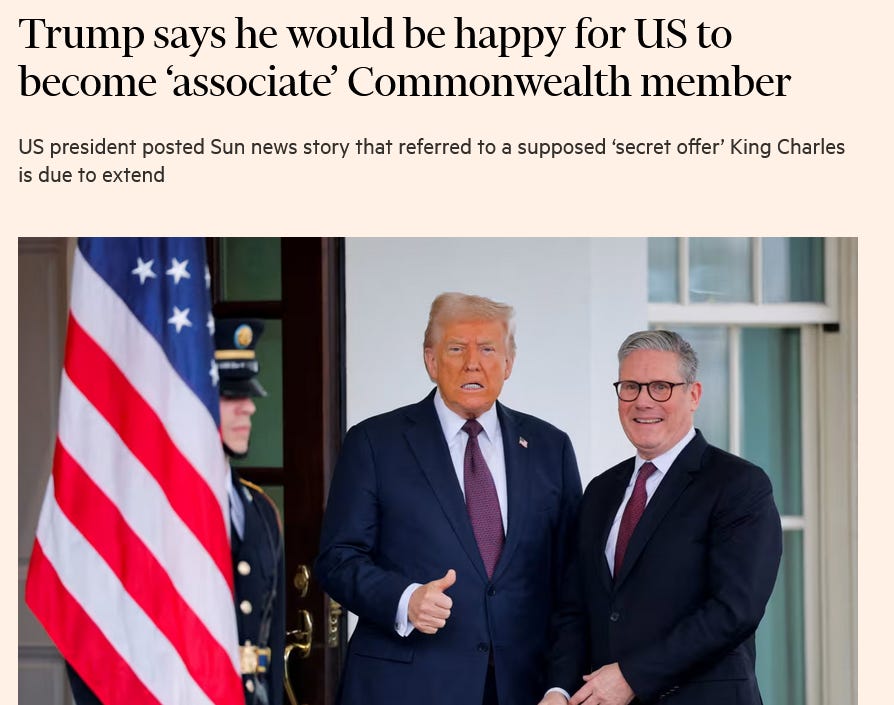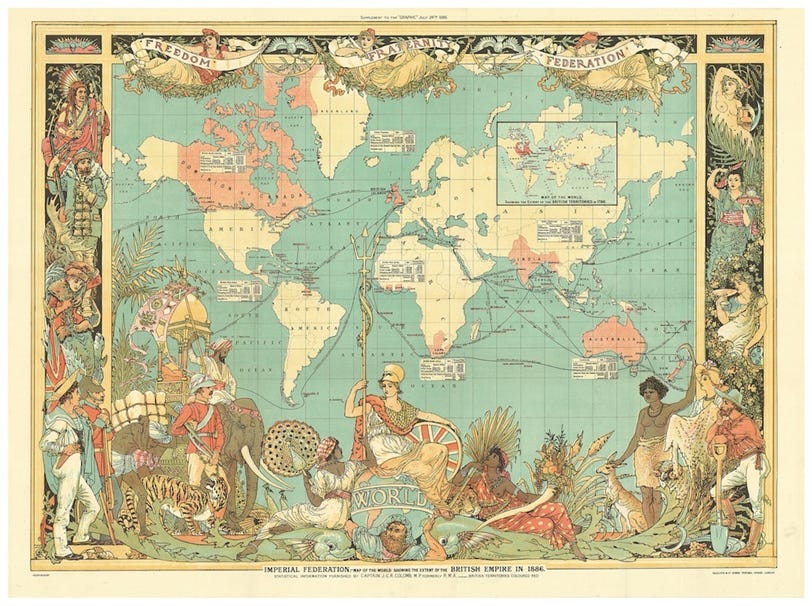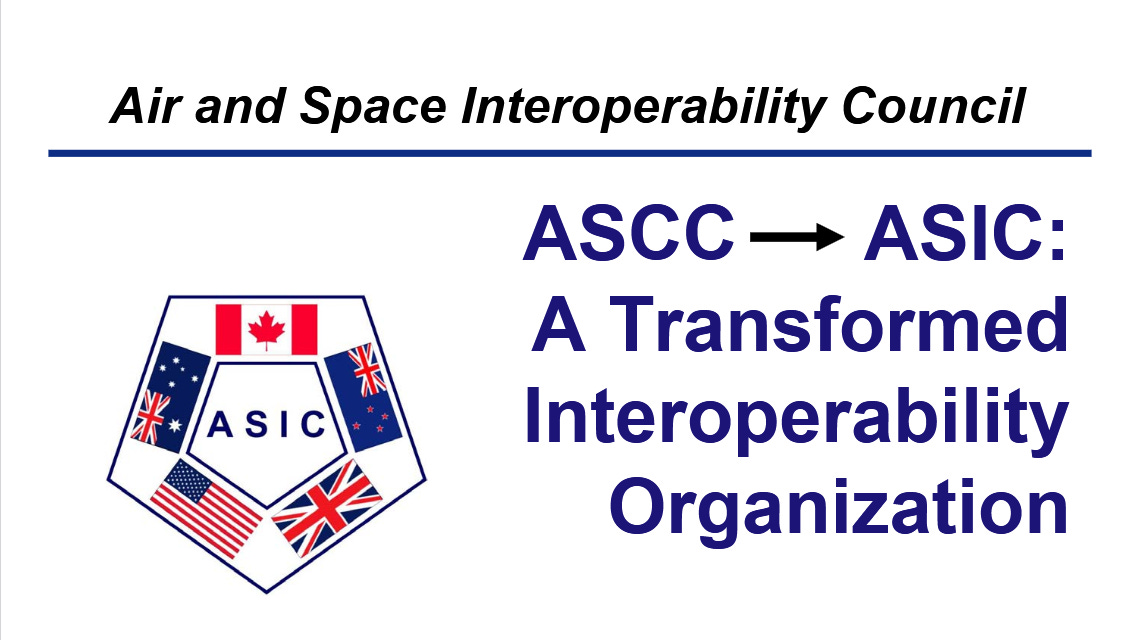I was nearly struck from my chair today when reading news reports that the American President, Donald Trump, was going to accept an invitation for the United States to join the Commonwealth of Nations.

For those not in the know, the Commonwealth of Nations is the “former colonies club” that came to replace the British Empire.

There are not tangible benefits aside from some rights at embassies and the like. Most of what the Commonwealth does is mind-numbing “democracy and human rights” rehash that we’ve all heard several thousand times before. There are lots of conferences, meetings, symbols, and of course many cultural events—but with cultures as disparate as those that compose the Commonwealth (Nigeria is nothing like India which is nothing like the Bahamas which is nothing like Britain) there is hardly any point in trying to make the Commonwealth sound particularist. It is globalism with a bit of British flare.
If we really want to strengthen the alliance between the Anglosphere countries, as I think any Anglosphere-based nationalist should, the United States, Canada, Australia, the United Kingdom, New Zealand, and Ireland should break from their current organizations (save for perhaps NATO) and create a sort of “Anglo Union” of the six nations inhabited by the people of the British Isles. We are six nations bound by shared ethnicity, history, the English language, the Christian faith, and a system of democratic governance that arose in the United Kingdom — this presents a compelling alternative to the overly broad Commonwealth. Rather than diluting our collective potential within a 56-member organization with diverse priorities, our six countries could form a tighter, more focused alliance centered on security, trade, and ease of movement. It would also allow for a much more integrated alliance framework so we can pull states like Australia and New Zealand out of their increasingly dangerous Chinese orbit. It may even allow the increasingly sensible United States to pull the rest of us into the realm of realism and out of the liberal base.
We are already integrated to a great degree both formally and informally. The US, Canada, UK, Australia, and New Zealand already work together sharing all of our intelligence with one another through the Five Eyes coalition (at least in principle). This cooperation could be extended to our militaries—sourcing parts, materials, and expertise from each other before looking further afield. The Border Five—an informal customs and border management arrangement between the same five countries—could be expanded into a more formal immigration system. We could and should make it easier for our citizens to travel between the six Anglosphere/Anglo-American countries with less hassle than people from other countries. I would even recommend implementing an “ease of movement” policy so that our citizens can live and work relatively freely between the six nations.
The Technical Cooperation Program, the Air and Space Interoperability Council, the AKUSA Signals Intelligence Agreement and much more could all be formalised, or further formalised, to bind the six core Anglosphere nations into something that resembles a true alliance of the civilisation that has grown out of the British Isles.

Economically, the six of our nations are already significant players. Even Ireland’s largest trading partner is the United States, doing three times the business it does with Germany. It’s third largest trading partner is the United Kingdom, and Canada ranks tenth. For Australia the US, New Zealand, and United Kingdom are all in the top 11 for its trading partners and an EU state does not appear until Germany in 12th place. Canada and America are one another’s largest trading partners and here in Britain non-EU countries plus Ireland account for 64.2% of our export market—America alone is 21.2% of our export market. A trade-focused union could ensure no tariffs go up between our countries, serve to harmonize regulations, and create a relatively open market for our products. I certainly trust New Zealand beef, Australian coal, American chemicals, and Canadian oil more than I do anything coming out of China, Africa, or the Middle East. Seeing “made in America” is not nearly as viscerally offensive to British sensibilities as “made in China” is, and that is because we can be sure of the quality of a product from peoples so similar to us.
The Commonwealth on the other hand consists of nations that are often in conflict with our economic interests, flood us with low wage labour (more on this shortly) and are entirely culturally alien from us.
Perhaps the most transformative aspect of my proposed union would be facilitating relatively easy movement of our citizens between the six countries. Ireland and Britani already have a free movement area, as do Australia and New Zealand through the Trans-Tasman Travel Arrangement (TTTA). I do not see it as a stretch to expand these two free movement areas to encompass all six countries. We could also do it without the immense baggage of the European Union—not even Ireland desires that nonsense and to this day operates its own visa policies, as did Britain when we were stuck in the EU.
Of course, one can hear the leftist critics already, lashing out with accusations of racism or colonial endeavour. But these are countries inhabited by similar peoples. People with origins in the British Isles make up nearly 70% of the European population of Canada while British Isles origin Australians are somewhere around 60% of the total population. Leftist complaints, as they are now being, should simply be ignored in pursuit of greater civilizational goals.
This six-nation union wouldn’t just be a pragmatic alliance; it could redefine how like-minded nations who share a similar origin and civilisation collaborate in the 21st century.
Support White Papers:
